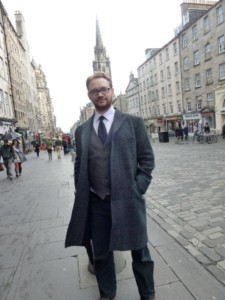
Circular Academia: Navigating the Dangerous Waters of Term Re-Assignment for the Religious Studies Project.
Fourteen contestants. One tetchy quizmaster. Three microphones. Numerous cases of wine. One glamorous assistant. Many bruised egos. A boisterous studio audience. A splash of irreverence. Dozens of questions. Four years of podcasts! A rapidly diminishing reservoir of academic credibility. And far, far too many in-jokes...
Perhaps my greatest argument against ‘non-religion’ has been based on the notion that it stands as a relational umbrella... A few weeks back, I found myself engaged in a one-sided debate with a colleague friend over the use of the term ‘non-religion.’ As it was at the end of a two-day conference, it was one of those casual conversations wherein certain sophisticated aspects of the preceding academic discourse spill over into the informality of a chat over drinks.
Here are some traditions that make this time of the year special. End-of-year listicles, the "War on Christmas" debate, animations of elves dancing with your family's heads pasted on... and of course, the RSP "Christmas" Special!
The idea for this roundtable was that it would follow on directly from this week's interview on religion and literature, but expand the discussion to cover a variety of points relating to narrative, autobiography and (auto)ethnography in the study of religion. Featuring Dr Wendy Dossett, Prof. Elaine Graham, Dr Dawn Llewellyn, Ethan Quillen, and Dr Alana Vincent.
A while back a few of us gathered for what became the first of a 'successful' bout of roundtables conducted by a cadre of 'amazing people' with differing and 'unique' opinions. In that first ‘test’ for the ones that would follow, six of us gathered together to discuss the ‘future of religious studies.’
"When I think back on it, one thing I truly enjoyed about Professor Strenski’s book—as well as his teaching style—was his ability to tangentially veer off topic while not losing complete track of the subject at hand. Tangents, I have always felt, are the instructor’s greatest tool. Not only do they assist in keeping the student’s attention, but as metaphor, paint the instruction in different hues than mere black and white."
Can Steve Sutcliffe talk about “habitus” for a full 60 seconds without deviation, hesitation or repetition? How much does David Wilson know about “Postmodernism”? Mr David Robertson is your host (ably assisted by Mr Chris Cotter) for this special festive episode of the Religious Studies Pro Recorded live in Edinburgh on December 20th, 2012.
How we can position the study of non-religion within the discipline of Religious Studies? In this episode, Chris Cotter is joined by Louise Connelly, Frans Jespers, Ethan Quillen, Steven Sutcliffe, and Teemu Taira to unpack the term 'non-religion'.
What is 'nonreligion'? Is it atheism? Is it secularism? Is it football? Today, Dr. Lois Lee, a leading scholar of nonreligion and the founding director of the NSRN, joins Chris and Ethan to discuss this emerging field of 'nonreligion' and critical methods for studying the 'nonreligious'. Tune in to learn more!
This discussion brings together a number of aspiring academics to reflect on some of the issues brought up in a recent podcast in a friendly and hilarious manner. The question cuts to the core of what academics who study religion are doing… are they taking care of religion? Are they antagonising it? What should they be doing? And judging by the various long tangents through which discussion meanders, the question certainly sparked our interest.
Ninian Smart was a proponent of the idea that Religious Studies should be "poly-methodical"; but should Religious Studies as a discipline incorporate theories and methodologies from multiple other disciplines, such as sociology, anthropology or history? When RS departments have run on an interdisciplinary basis, have they been successful?
In another roundtable gathering, conversation ranges from the strengths and weaknesses of such data, whether there is more to the social sciences than quantitative methods, and the place of the social sciences within a multi-disciplinary Religious Studies field. Can we trust social sciences when we study religion? Is a social scientific approach the future of religious studies?
After this week’s podcast, which involved eight scholars giving their views on the future of Religious Studies, there was really only one way we could create a suitably collective and varied response – six postgrads sitting around a table, accompanied by pink gin and our trusty dictaphone. Conversation ranges from the public perception of what Religious Studies does, ...
" In our contemporary world we tend to find ourselves more absent-mindedly sailing toward the yawning mouth of that swirling vortex known as “a definition of religion.” We need to be cautious with the application of new terms. We seem too often prone to kneejerk patchwork, slathering layer upon layer of temporary fixes, either impudent in our knowledge of foundational issues, or victims of deep denial. We long to resolve ambiguity by applying more ambiguity, when we should just dig up the foundation and rebuild."
This work is licensed under a Creative Commons Attribution- NonCommercial- NoDerivs 3.0 Unported License.
The views expressed in podcasts, features and responses are the views of the individual contributors, and do not necessarily reflect the views of The Religious Studies Project or our sponsors. The Religious Studies Project is produced by the Religious Studies Project Association (SCIO), a Scottish Charitable Incorporated Organisation (charity number SC047750).